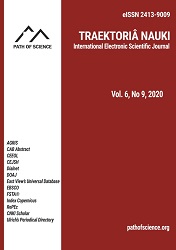Трактування юридичної відповідальності суддів в Україні
Interpretation of Legal Liability of Judges in Ukraine
Author(s): Yaroslav SkoromnyySubject(s): Constitutional Law, Philosophy of Law
Published by: Altezoro, s. r. o. & Dialog
Keywords: legal responsibility; justice; judicial process; legislation; court; judge;
Summary/Abstract: The article presents the conceptual principles of interpretation of the legal liability of judges in Ukraine. Based on the conducted research, it has been revealed that by the provisions of the Constitution of Ukraine and the Law of Ukraine “On the Judicial System and the Status of Judges” judicial power in Ukraine is entrusted to judges. It has been proven that judges are guided by the superiority of law and are independent in administering justice. Based on the provisions of the law, it has been established that without the consent of the Supreme Council of Justice a judge cannot be taken and kept under arrest until the moment when the court passes the corresponding sentence, except for serious and extremely serious crimes. It has been established that a judge can be prosecuted for a court decision, except in cases of a crime or disciplinary action. It is determined that the key feature of the legal responsibility of judges is the directly negative nature which it bears for the offender. At the same time, the insufficiently high level of conscientious performance of official duties, which are defined by legal norms, and the low level of self-awareness are considered to be the manifestation of the legal responsibility of judges. It has been found out that there is no reason to distinguish procedural responsibility as an independent type of legal responsibility of judges because the consequences of procedural activities of judges in resolving court cases are manifestations of their legal position and personal convictions. It is established that the essence of the legal responsibility of judges is aimed at 1) promoting the legality and objectivity of the trial and making a court decision on this basis by the law; 2) creation of a holistic legal consciousness of judges of the judicature; 3) prevention of offenses that are committed and may be committed by judges; 4) ensuring a high level of independence of judges; 5) strengthening the authority of the court and raising the level of citizens to the court; 6) lustration of the judicature within the framework of the provisions defined by the law, according to which the judicature will include only fair and dedicated judges.
Journal: Traektoriâ Nauki
- Issue Year: 6/2020
- Issue No: 09
- Page Range: 5010-5018
- Page Count: 9
- Language: Ukrainian

